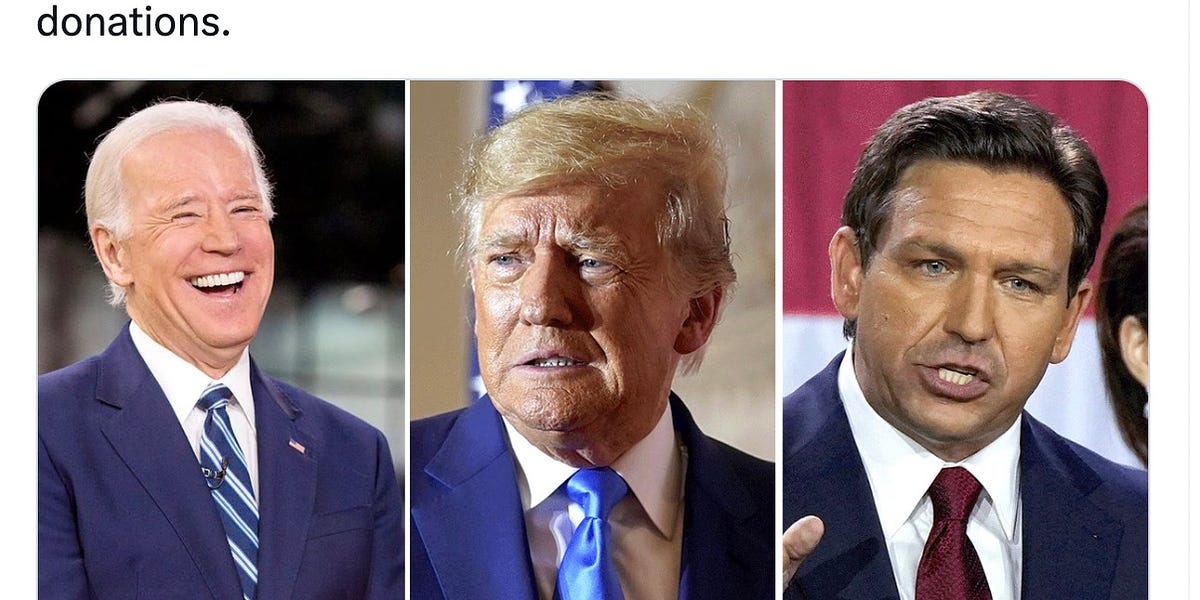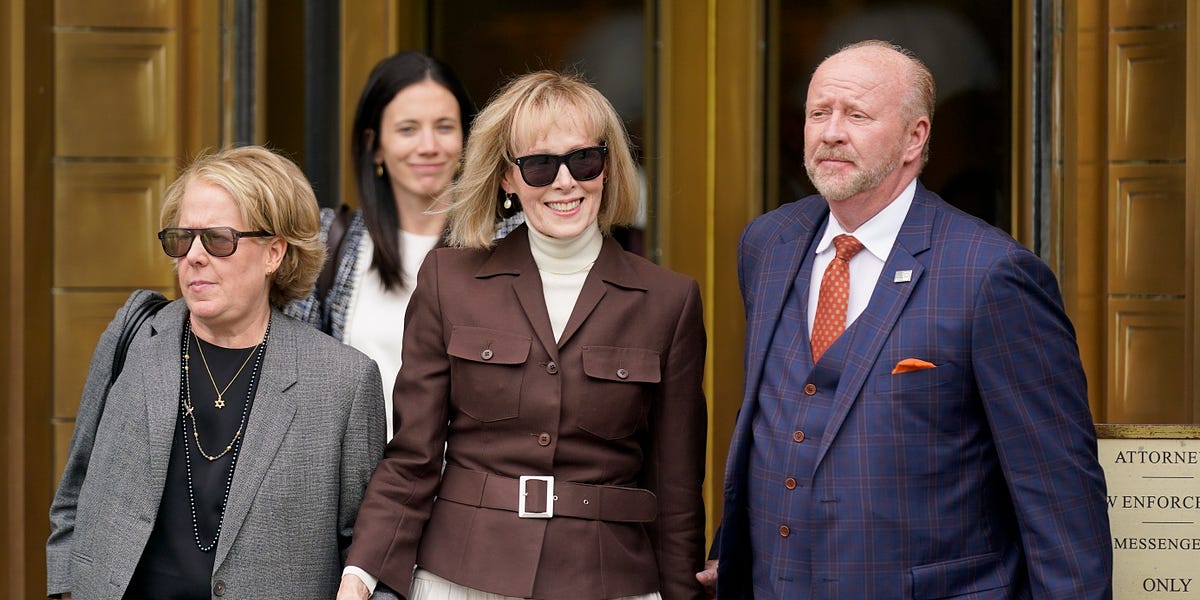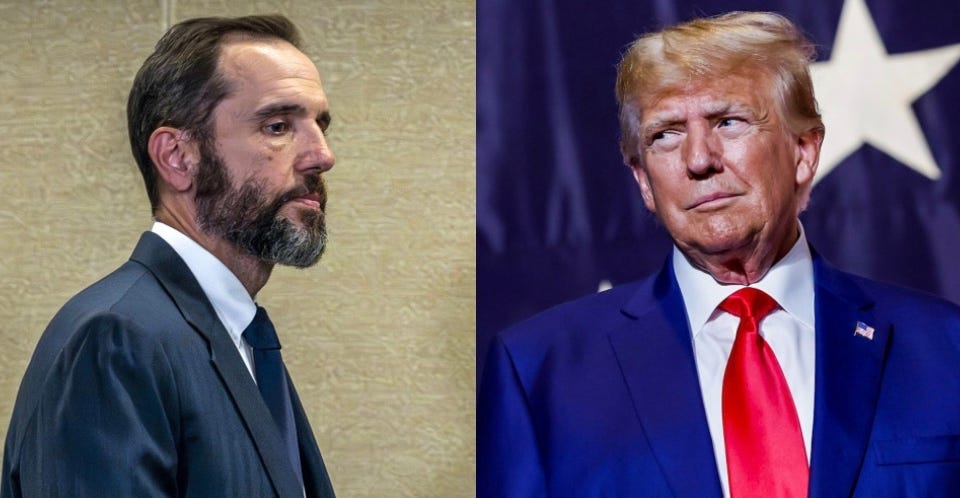Part 1
Mr. Trump is having a bad week in court. My favorite one is Georgia, so I’ve saved it for last, but you’ll want to make sure you read that far—or skip down to it if your end of the week attention span is short.
Mar-a-Lago
Today, ABC
reported that a target letter was sent to an unidentified Trump Organization employee who had dealings at Mar-a-Lago. There wasn’t much more detail than that. But we know that the grand jury in the Southern District of Florida has continued working since the indictment against Trump and Nauta was returned. Prosecutors aren’t permitted to continue to use the grand jury to develop evidence after indictment, so this means something more had to be afoot. It’s entirely possible that it’s this (there was also some tantalizing reporting that prosecutors are interested in Trump properties in Florida beyond Mar-a-Lago).
The Federal Principles of Prosecution, the federal prosecutors’ bible,
defines a "target" as “a person as to whom the prosecutor or the grand jury has substantial evidence linking him or her to the commission of a crime and who, in the judgment of the prosecutor, is a putative defendant.” In plain English, target means a person prosecutors believe they have sufficient evidence against and intend to charge.
So what did this person do? It’s likely they were involved in Trump and Nauta’s efforts, that are laid out in the indictment, to obstruct the investigation into Trump’s retention of classified documents at Mar-a-Lago. There has been
reporting that prosecutors were interested in Trump employee conversations about footage from security cameras on the property after prosecutors showed interest in reviewing them. The employees reportedly discussed how the cameras worked and how long images remained stored in the system. Those employees were reportedly interviewed. That comports with reporting that this target may have committed perjury in front of the grand jury.
Surveillance footage ended up providing key evidence prosecutors used to prepare the indictment against Trump and Nauta. They alleged that it established that Trump, with Nauta’s help, tried to hide classified materials from federal officials who sought their return. That evidence is strong, but it’s always good to have a witness who can explain what happened. That could be what this is about.
Prosecutors probably want to avoid a superseding indictment and an additional defendant, which could slow down a case they seem determined to fast track. The goal here likely isn’t to indict a low level employee who ended up helping hide materials before Trump’s lawyers searched the storage area. It would be to flip them so they could be used as a witness. A likely prospect is that if this target became a cooperater, he could ratchet up the pressure on Walt Nauta. It’s far more likely that a low level employee, the person news reports are describing, could testify against Nauta than against Trump. If the target could testify, for instance, that Nauta told him Trump had directed them to take certain boxes to him and they followed through, those could be important statements in furtherance of the charged conspiracy that would be admissible at trial. A cooperator like this can be a windfall. Or not. Prosecutors never know until they can get their truthful testimony under oath.
The target refused to answer any questions when he was contacted by the media, reportedly saying only that “It's none of your business" when asked about the target letter. That can mean a lot of different things. Whether this gentleman is a witness for the government in waiting or a potential defendant in an obstruction case remains to be seen.
The Special Counsel’s January 6 Investigation
Jack Smith continues to look like a prosecutor who is serious about getting a major, multi-faceted criminal investigation across the finish line. We don’t have any clarity on who, if anyone, he is considering charging and what crimes he will charge them with. It’s frustrating. I have more questions than answers at this point.
It’s been clear for a long time that Smith views this as more than an investigation into just the events of January 6. He seems to be considering a wide range of activity designed to interfere with the outcome of the election, the certification of the electoral college vote and the transfer of power. Whether he’s considering one overarching conspiracy or a number of separate ones remains to be seen. Something that Smith has made clear with his moves so far is that he’s at least five steps ahead of where the reporting has him. That’s reassuring.
Ahead of the Mar-a-Lago indictment, that one thing I was certain of was that it would contain surprises, and it did. I expect the same in connection with the January 6 investigation.
CNN
reported today that Smith has interviewed the Secretaries of State in Pennsylvania and New Mexico. He previously interviewed officials in the other five states targeted for the creation of fake slates of electors by the Trump team. Hearing the tape with Georgia Secretary of State Brad Raffensperger where Trump begged for votes didn’t sound like a one-off, and Georgia alone could not have changed the outcome of the national election. It’s always seemed clear that the scheme was larger, and it looks like Smith is focused on finding out precisely what its contours were and whether they were criminal. This is one part of the scheme that, if Smith charges it, could reach deeply into Trump’s lawyers and other advisors as either witnesses or defendants.
There was also reporting earlier this week that Jared Kushner testified before the grand jury with no fanfare, meaning he did not make any effort to pushback against appearing. Kushner and others are apparently being questioned about whether Trump truly believed he’d lost the election. The reporting says Kushner believed he did.
It’s valuable for prosecutors to know that. They need to know what a witness is going to say on the stand whether it’s good for them or not. That’s especially true if the witness may show up to testify for the defendant. And, whatever Kushner’s opinion is, he can also be questioned about what people told Trump, how Trump reacted, what he did next and so forth. Information about who, what, when, where and (perhaps) why is very valuable to prosecutors. It can corroborate others, provide investigative leads, or help discern when a witness isn’t being truthful, if their story conflicts with other evidence.
There is an interesting question about the admissibility of witness opinions that may come into play here. We’ll discuss it in more detail as it comes up, but the basic rule is Federal Rule of Evidence 704, which provides that, “In a criminal case, an expert witness must not state an opinion about whether the defendant did or did not have a mental state or condition that constitutes an element of the crime charged or of a defense. Those matters are for the trier of fact (the jury) alone.” There can be a fine line here between opinion and testimony about the facts. The decision about whether a witness’s views are admissible at trial is up to the judge’s discretion.
It’s an interesting question here because while Kushner may be willing to testify that Trump thought he’d won, we learned this week prosecutors have taken testimony from others who don’t agree. Two witnesses testified previously before the January 6 Committee, so we know something of the substance of their testimony. The fact that prosecutors have obtained it suggests they are currently assessing how strong their evidence is. They will have to prove Trump’s state of mind to convict him—that he knew he had lost but proceeded to act as though his allegations of fraud and a stolen election were the truth. Notably, Alyssa Farrah Griffin, Trump’s White House Director of Strategic Communications repeated a conversation with Trump where he says words to the effect of, can you believe I lost to that guy—a reference to Joe Biden. And General Mark Miley, the Chairman of the Joint Chiefs of Staff said that Trump acknowledged his loss in an Oval Office meeting in late 2020.
The case against Trump in this regard has always seemed intuitively strong. We saw it play out before our own eyes in ways that made it seem incredible prosecutors would take much time to get to work investigating and put a case together. After 2021, where DOJ seemed willing to let prosecutors like Fani Willis in Georgia go ahead without them, it now looks like the government has put a case together, meticulously compiling evidence that will be admissible in court, and that the most important indictment that can be brought against Mr. Trump, the one charging him with trying to end our democracy, may finally be close.
There are lots of moving parts in a case like this. So it’s worth repeating. Expect surprises when we finally learn what Smith has planned.
Mr. Trump is having a bad week in court. My favorite one is Georgia, so I’ve saved it for last, but you’ll want to make sure you read that far—or skip down to it if your end of the week attention span is short. Mar-a-Lago Today, ABC reported that a target letter was sent to an unidentified Trump...

joycevance.substack.com




